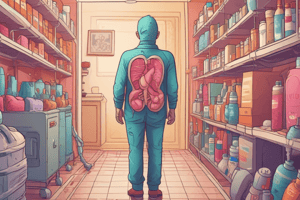Podcast
Questions and Answers
What is traditionally defined as an increase in daily stool weight in diarrhea?
What is traditionally defined as an increase in daily stool weight in diarrhea?
- > 300 g/day
- > 200 g/day (correct)
- > 400 g/day
- > 100 g/day
Chronic diarrhea accounts for 10% of the population.
Chronic diarrhea accounts for 10% of the population.
False (B)
What are the three primary functions of the small bowel?
What are the three primary functions of the small bowel?
motility, digestion, absorption
In normal stool fluids processing, the large bowel absorbs approximately _______________ L/d.
In normal stool fluids processing, the large bowel absorbs approximately _______________ L/d.
Match the following nutrient/vitamin absorption sites:
Match the following nutrient/vitamin absorption sites:
What is the cause of Osmotic Diarrhea?
What is the cause of Osmotic Diarrhea?
Inflammatory Diarrhea is caused by exogenous secretagogues.
Inflammatory Diarrhea is caused by exogenous secretagogues.
What is the main reason for Diarrhea caused by motility disturbances?
What is the main reason for Diarrhea caused by motility disturbances?
Osmotic Diarrhea is caused by the ingestion of ______________ osmotically active substances.
Osmotic Diarrhea is caused by the ingestion of ______________ osmotically active substances.
Match the following types of diarrhea with their causes:
Match the following types of diarrhea with their causes:
Flashcards are hidden until you start studying
Study Notes
Normal Stool Processing
- The GI system processes 8-9 L/day of stool fluids, with 1-2 L/day ingested and 7 L/day created
- The small bowel reabsorbs 6-7 L/day, and the large bowel absorbs 1-2 L/day
- This results in 100-200 g/day of stool created
- A decrease in absorption or increase in secretion by as little as 1% can lead to diarrhea
Nutrient/Vitamin Absorption
- Carbohydrates/simple sugars are absorbed in the duodenum/jejunum
- Vitamin B12 and short-chain fatty acids are absorbed in the ileum
- Fats, bile salts, and vitamin K are absorbed in the colon
- Amino acids, iron, fat-soluble vitamins (A, D, E, K), calcium, magnesium, and other vitamins and minerals are also absorbed in the GI system
Chronic Diarrhea
- Affects 5% of the population
- Most frequent etiologies include:
- Functional disorders (e.g., irritable bowel syndrome)
- Inflammatory bowel disease (IBD)
- Malabsorptive syndromes
- Chronic infection
Small Bowel Function
- Motility
- Digestion
- Absorption
- Immune defense
Pathophysiology of Chronic Diarrhea
- Types of chronic diarrhea:
- Osmotic diarrhea
- Secretory diarrhea
- Inflammatory diarrhea
- Motility disturbances
Osmotic Diarrhea
- Causes:
- Ingestion of poorly absorbed osmotically active substances (non-electrolytes)
- Carbohydrate malabsorption (e.g., disaccharidase deficiency, glucose-galactose malabsorption, fructose malabsorption)
- Mechanism: retention of unabsorbed ions in the intestinal lumen, leading to water retention to maintain intraluminal osmolality
Secretory Diarrhea
- Causes:
- Exogenous secretagogues (e.g., cholera toxin)
- Endogenous secretagogues (e.g., neuroendocrine tumor)
- Absence of ion transporter (e.g., congenital chloridorrhea)
- Mechanism: increased net flux of ions into the intestinal lumen, leading to secretion of anions (chloride or bicarbonate) and inhibition of sodium absorption
Inflammatory Diarrhea
- Causes:
- Inflammatory bowel disease (IBD)
- Ischemic colitis
- Diverticulitis
- Radiation colitis
- Infectious causes (e.g., invasive bacterial, parasitic, or viral infections)
- Mechanism: structural damage to the intestinal mucosa, impairing absorption and stimulating secretion
Diarrhea - Motility Disturbances
- Causes:
- Abnormal intestinal motility (e.g., hyperthyroidism, dumping syndrome, postvagotomy diarrhea, postsympathectomy diarrhea, diabetic autonomic neuropathy)
- Mechanism: decreased contact between digested food products and the intestinal mucosa, leading to diarrhea
Clinical Classification of Chronic Diarrhea
- Organic vs. functional
- Fatty
- Watery
- Inflammatory
Studying That Suits You
Use AI to generate personalized quizzes and flashcards to suit your learning preferences.




